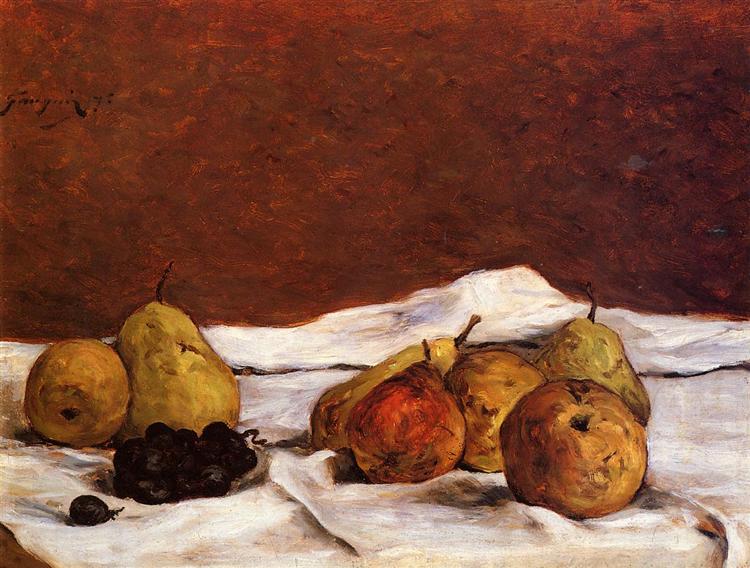描述
Paul Gauguin's "Pears and Grapes" (1875) stands as a fascinating example of everyday life, underlining the artist's interest in ordinary objects and nature. In this painting, Gauguin uses the depiction of fruit, specifically pears and grapes, to explore the richness of coloration and texture, two elements that would be central to his career as a post-impressionist painter. The objects are arranged in the center of the canvas, forming a visually pleasing and balanced still that draws the viewer's gaze, establishing a dialogue between the organic forms and the spaces that surround them.
The choice of the variety of fruit is not accidental; the pears, with a soft and well-defined yellow colour, contrast with the intensity of the grapes, which have a deep purple hue. This chromatic contrast not only highlights the freshness and vibrant reality of nature, but also evokes a sense of abundance. The palette used by Gauguin reflects his desire to move away from the more muted tones of his contemporaries. Rather than a faithful representation of reality, the artist suggests a sense of idealism that prefigures the themes he would develop later in his work.
Gauguin's style is characterized by the use of simple lines and an almost sculptural composition that gives weight and robustness to the pears and grapes. The contours of the fruits are presented with a firm stroke, characteristic of his early work that is still deeply influenced by Impressionism, but which begins to show a deviation towards something more symbolic and personal. This simplified representation is a precursor to the approach that Gauguin would later adopt in his artistic production, where form and color become carriers of meaning beyond mere visual representation.
On the other hand, it is important to mention that the work was painted during a formative period in Gauguin's life, when he was beginning to distance himself from his career as a stockbroker and to immerse himself more deeply in painting. "Pears and Grapes" is a clear indication of his interest in capturing the essence of things, a hint of his future passion for symbolism and the tropical themes he would explore in Polynesia.
Although this painting does not feature human figures, the absence of characters does not detract from its quality. In fact, the concentration on objects allows the viewer a deeper immersion in their pure essence, revealing Gauguin's ability to transform the simple into the sublime. This work can be related to other works from his time, where nature and inanimate objects are protagonists, but always filtered through the artist's subjective prism, which leads to the exploration not only of the visible, but also of the emotional and spiritual.
Reflecting on Pears and Grapes, we see that Gauguin begins to raise questions about the symbolism of color and form, posing ideas that resonate in later modern painting. The work can be seen as a precursor to a path in which art begins to move inward toward the viewer, soliciting a personal interpretation of what is being observed. Thus, Pears and Grapes is not just a representation of fruit on a plate, but an opening to the possible hidden meanings in the everyday, anticipating the constant evolution of Gauguin's artistic practice.
KUADROS ©, a famous painting on your wall.
Hand-made oil painting reproductions, with the quality of professional artists and the distinctive seal of KUADROS ©.
Painting reproduction service with satisfaction guarantee. If you are not completely satisfied with the replica of your painting, we will refund 100% of your money.

